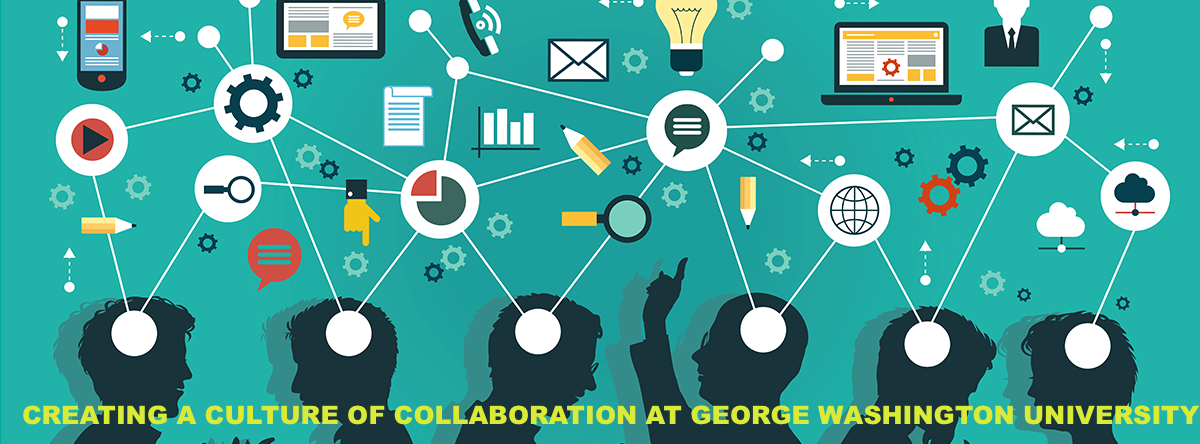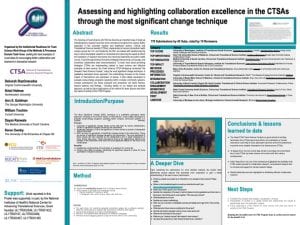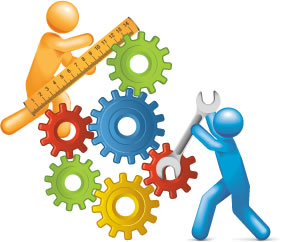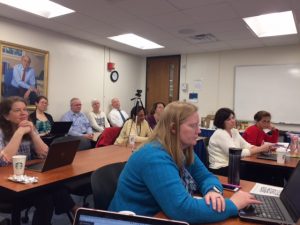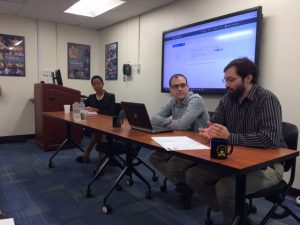Assessing and highlighting collaboration excellence in the CTSAs through the most significant change technique
Author: glotrecc
SciTS 2019 Registration Open
10th Annual International
Science of Team Science Conference
SciTS2019
May 20-23, 2019 | Lansing, Michigan
Register TODAY!
The Science of Team Science (SciTS) field is building the evidence base for how to conduct, manage, and support effective and efficient team-based research and ultimately enhance the science it produces.
The SciTS conference is the annual international forum dedicated to SciTS, bringing together thought leaders from a broad range of disciplines and fields, including: communications, management, social and behavioral sciences, information technology, systems science, and translational research. It provides investigators, academic administrators, and funders with state-of-the-art knowledge, strategies, and connections. SciTS scholars, scientists engaged in team-based research, institutional leaders who promote collaborative research, policymakers, and federal agency representatives will be in attendance.
The 2019 conference for the SciTS community will be hosted by Michigan State University in Lansing, Michigan.
Introducing ‘Science Pods’
Podcasts offer scientists exciting new options for sharing their research, engaging in professional conversations, and developing interdisciplinary communities. From news shows like NPR’s Science Friday to professional development shows like the Univ. of Oregon’s Research in Action to the real-life stories of scientists on StoryCollider, there are hundreds of shows that focus on different aspects of being a researcher. To help cut through the clutter, SciencePods now offers a curated list of podcast and podcast episodes just for scientists. The featured episodes focus on topics such as reproducibility, life as a post-doc, and collaborating with colleagues from other disciplines. You can even subscribe to the curated list and get updates right in your favorite podcast app.
BLOG: Institutional change in the era of team science
Team science approaches have accomplished biomedical breakthroughs once considered impossible.
- Completion of the Human Genome Project
- Development of antiretroviral medications to control AIDS
- Discovery of the causative agent for Severe Acute Respiratory Syndrome (SARS)
- Successful development of the HPV vaccine
The collaboration of dedicated researchers from diverse disciplines and institutions has been critical to these achievements. While the increasing size of team-based research projects brings greater scientific expertise and more advanced instrumentation to a research question, it also increases the time required for communication and coordination of work. If these challenges are not recognized and addressed, projects may fail to achieve their scientific goals. Individual scientists must make decisions about whether to invest time and energy into collaborative projects or to focus on individual investigations.
While team science promises individual and team benefits in creating and implementing
innovations, adapting to the team science framework has been cited as one of the more difficult adjustments for academic organizations due to a variety of contextual environmental influences such as:
- Institutional infrastructure and resources for communication and data sharing
- Organizational policies—such as promotion and tenure policies—that impact team-based endeavors
- Team processes, including the existence of agreements related to proprietary rights to data and discovery, as well as mechanisms for feedback and reflection
- Team members' collaborative skills and experiences
- Interpersonal dynamics among team members
Interdisciplinary teams in team science represent a shift for the academic research culture which has typically supported distinct departmental structures and has valued individual effort for promotion and tenure of faculty. Increased complexity and high diversity of membership, deep knowledge integration, and high task interdependence all pose challenges for individuals and institutions. Junior faculty face several challenges in sharing recognition, credit, and power with senior faculty who are more established researchers. In particular, since academic career advancement commonly focuses on individual achievement, team science might negatively impact the career advancement of early stage researchers. Some efforts to establish norms for evaluating individual accomplishments in the context of a team effort have been made, but are less widely implemented. The need to be recognized for individual accomplishments in order to move forward in an academic career may give rise to research team conflicts.
Organizational change is needed to address these challenges. To advance team science and reap its benefits, systematic organizational change in education and training is needed. Faculty development at the system level can lead to organizational change, and can begin with a new vision for faculty development and new skill sets for faculty developers. Traditionally, faculty development is often treated as a service-oriented entity and considered as an end rather than a means to accomplishing important goals. Faculty development programs focus on personal mastery within the mission of the organization. Faculty developers are those who are good facilitators and conduct workshops and sessions focused on personal mastery. Personal mastery involves helping individuals achieve their maximum potential as educators, researchers, and patient care providers. In the era of team science, the position of faculty developer demands vision, creativity, and a take-charge attitude to bring systematic change by offering faculty development at micro (individual), meso (group), and macro (organizational) levels within institutions. Faculty developers must cultivate systems aimed at creating a common language focused on pedagogy. They must also work with leadership to create new policies, develop rewards and incentives for institutional missions, and establish institutional goals with respect to scientific collaboration. They must possess resilient organizational, communicative, and administrative skills, and must have the ability to take the lead in promoting a spirit of community among faculty, students, and administrators.
In this blog I wish to explore my view of faculty developers as agents of change. By taking a systematic approach to change, faculty developers are in the best position to help their institutions become learning organizations during the team science era.
I hope to foster dialogue by posing the following questions to those of you who serve as faculty developers:
(1) How do we take a stronger, proactive approach to help solve issues raised in the era of team science?
(2) What kinds of institutional change can we hope to bring about with a systematic approach?
Darshana Shah, PhD., is a Professor of Pathology and Associate Dean for the Office of Faculty Advancement at the Marshall University Joan C. Edwards School of Medicine. She is the founding Editor-in-Chief of the Marshall Journal of Medicine (MJM) and (added)serves on the board of International Network fo the Science of Team Science. She is a Harvard Macy Fellow, and currently participates as an invited faculty in the program for Leading Innovations in Healthcare & Education. Shah teaches a course on team science and also leads professional development in the field of team science for the West Virginia Clinical & Translational Science Institute. Darshana’ s areas of professional interest include faculty vitality and retention. You can follow her on LinkedIn or Twitter @DarshanaShah.
Symposium: Social Machines for Transdisciplinary Science (February 12)
Podcast on Building Effective Teams from Oregon State University E-Campus with Dr. Guy Lotrecchiano
On this episode of the Oregon State E-Campus Research in Action Program, Dr. Katie Linder is joined by Gaetano R. Lotrecchiano, EdD, PhD, an Associate Professor in the Department of Clinical Research and Leadership in the School of Medicine and Health Sciences. He is also the Associate Dean of Innovative and Collaborative Innovation at the George Washington University. Dr. Lotrecchiano’s work is dedicated to team and collaboration science. He is also the President-Elect of the International Network for the Science of Team Science.
RIA # 142: Dr. Gaetano Lotrecchiano on Building Effective Teams
Request for Contributors to C3@GWU
The University Seminar at the George Washington University entitled, “Creating a Culture of Collaboration at the George Washington University” or C3@GWU
https://blogs.gwu.edu/collaborativeculture
seeks blog authors for the upcoming academic year (2018-2019).
The C3@GWU Seminar Objectives are to:
- Assemble knowledge communities (“think tanks”) of key contributors and stakeholders from throughout and beyond GWU to foster cross-disciplinary discourse and generate agendas for action in creating a collaborative culture at GWU.
- Explore key topical areas critical to scientific collaboration within and beyond the GWU scholarly community.
- Examine critical areas of academic and organizational collaborative functioning that will strengthen a growing culture of collaboration at GWU.
- Propose collaborative and team protocols, policies, and activities to university leadership and decision-makers responsible for empowering GWU collaborative science.
- Disseminate key products and create knowledge-sharing events that will enhance collaborative activity at the GW department, school, and university levels.
This program is in its 3rd year and a major goal is to introduce to the GW community to international voices dedicated to a number of key areas in collaborative science including:
- Developing and educating team scientists
- Measuring team effectiveness
- Technologies for collaboration and scholarship informetrics
- Required organizational supports for team science and collaboration
- Faculty reward and recognition for collaborative activities,
- Issues related to crossing cultural, ethnic, and gender boundaries in science.
If invited to publish your blog idea you will receive as a C3@GWU Blogger:
- Editing and preparation assistance of your message for the blog site
- Solicited participation of our over C3@GWU followers.
- Distribution of your contribution through Twitter
- A $50 Amazon gift card (GWU Blog authors are not eligible for the gift card)
Blog ideas might include:
- A synopsis of one of your recent publications
- An open editorial of a recently published seminal work
- A report on a work in progress
- Teaching and learning tips
- Reflections on collaborative processes at your institution.
- Others…
Interested Blog authors should provide:
- Name
- Contact Information
- Institution
- A brief (100-150 word) statement of a blog idea.
- The key C3@GWU interest area listed above that your idea addresses.
- Please identify a month in the upcoming year that might hope to publish your blog (October 2018-May 2019).
- Return email materials to glotrecc@gwu.edu.
- There is no deadline to this solicitation and all ideas will be considered for their fit with the key areas of the C3@GWU program.
- In addition to individuals, teams and groups are HIGHLY ENCOURAGED to submit.
Subscribe to follow at https://blogs.gwu.edu/collaborativeculture
Register for Learning the Benefits of Team and Interprofessional Research
Learning the Benefits of Team and Interprofessional Research
To Register click HERE
April 10, 2018, from 1-3 PM
Marvin Center, Room 403
1-2 PM: Scholarly Panel on Learning to do Team Science
2-3 PM Case Study Analysis from an
Interprofessional and Team Perspective
Save the Date and Register: Learning the Benefits of Team and Interprofessional Research
Learning the Benefits of Team and Interprofessional Research
To Register click HERE
April 10, 2018, from 1-3 PM
Marvin Center, Room 403
1-2 PM: Scholarly Panel on Learning to do Team Science
2-3 PM Case Study Analysis from an
Interprofessional and Team Perspective
Thought Leaders Convene to Share About Collaborative Technologies at GWU
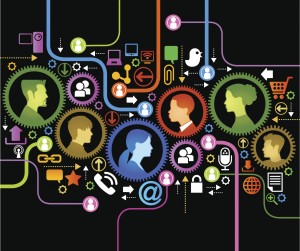
The C3@GWU hosted a Better Collaboration via Better Tools panel presentation and discussion on Monday, January 22, 2018 in Himmelfarb Library. Presenters included Rachel Breslin from The Lab@DC, Dacian Reece-Stremtan from GW IT, and Garrett Fields from SMHS IT. The presenters shared information about multiple collaborative tools including Open Science Framework, TeamViewer, Jira, WebEx, Box, Jabber and Google Docs. The session concluded with a demonstration of the steps in creating an Open Science Framework project instance, by Megan Potterbusch from Gelman Library. There were robust conversations throughout the morning regarding best practices for leveraging these tools for collaborative work, GW policies regarding types of data permissible in different supported platforms, and tips to avoid inadvertent public disclosure of data that should remain private.
